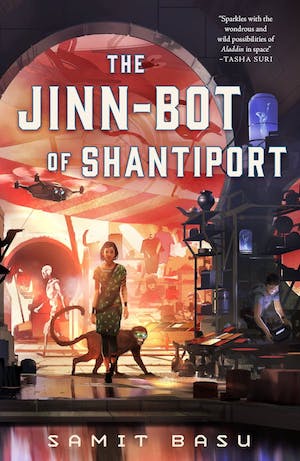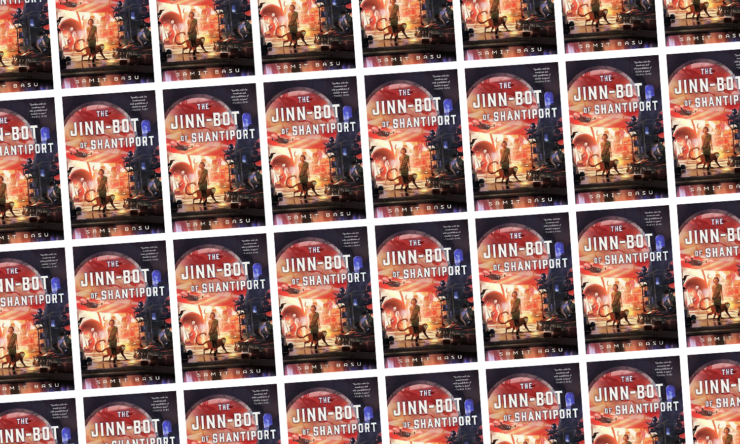A ring. A lamp. A storytelling bot that gathers all the narratives as they unspool. An idealist, her bitter mother, her monkey-bot brother. A not-Prince. A crime lord after world domination. A city that exists against all odds. And a story that refuses to die.
Samit Basu’s The Jinn-Bot of Shantiport is a fun, exuberant romp that’s being pitched as Aladdin meets Murder-bot. Which is pretty much what it is. It’s smart, bursting with ideas and novel concepts; fun, full of snappy dialogue and humour; complicated, with plenty of political, post-colonial commentary. It is also chaotic, info-dumpy at times, tells a lot more than it shows, and can feel like a detailed TV series treatment, or elaborate RPG bible.
The titular Shanitport is a vibrant, chaotic city, falling apart but bustling, inventive but disastrous. Violent, loud and torn between rival political parties and megalomaniacs and oligarchs and thugs. The city is quite literally drowning. The rich live in palatial homes and the poor suffer in the mud; a huge economic disparity is accepted as the norm. Surveillance is rampant, and bots are commonplace yet mostly considered second-class citizens, even though many are sentient. Everyone says the world is ending, so those who can are jetting off to other lands while those who can’t are surviving as best they can until the inevitable complete decline. Shantiport may hold on to ancient stories and clans and alliances, and it is both the future, and the future apocalypse coexisting in a shared chaos.
Anyone from a major city in the Indian subcontinent will be familiar with this scenario; we’ve lived like this for years, in collapsing cities trapped between hungry, corrupt powers who “may have their own differences, but always somehow manage to work together in the end.” What these powers always overestimate though, is the sheer will of the citizens, and their desire to be more than the city allows them to be. And that’s where Lina comes in. A local tour guide, she carries the heart of the city in hers, with a great love for Shantiport and its people. Lina’s parents, both raised in opposing clans, were joined together not just in their love for each other but also for their city. As young idealists they hoped to create revolutionary ways to improve Shantiport, but when Lina’s father vanished suddenly, her parents’ plans were abruptly discarded. Now, though she has been raised to stay under the radar, Lina wants to bear their torch onwards and is in search of an artifact her father had left behind—tech that could help lead her to improving the lives of everyone in Shantiport.
Buy the Book


The Jinn Bot of Shantiport
Her monkey bot-brother Bador has delusions of Bollywood hero-style grandeur, and mainly wants to get off this rock so he can make his heroic fortune across the galaxy, but while he’s stuck here in Shantiport, he is helping Lina with her search. It is during one of his searches in the mud, muck and rubble of the city that he finds Moku, a floating sentient storybot who is actually the narrator of the whole novel. Moku is very much a character too, and grows into himself during the course of the book. It can be a little distancing to always only hear the story from the storybot’s perspective.
We don’t ever really get inside Lina or Bador’s heads, and are always in Moku’s, with his bot-thoughts and perspectives. And Lina tends to hold back from sharing too much with Bodor and with Moku; she’s secretive and has her reasons for this, but it does make her journey a little harder to connect with, though it’s easy enough to write off her motivations to a generic saving-the-world-before-bedtime idealism.
It can also mean that there is, again, a lot of telling going on. Moku’s the storybot who tells the story, which could be fun, if we didn’t end up having to hear him—literally—tell the story quite so often.
Conversations can get long, entire debates are presented as is (albeit about important topics; Basu isn’t going to shy away from heftier topics), and there is a lot of banter—fun, but also a little grating at times, as it takes on the pace and cadence of a snappy superhero movie a little too well, a little too fast. Same can be said for the plot—some quick inferences that are a little too convenient, many cinematic action sequences, huge scale bot fights and chase sequences, some dramatic sudden plot twists that are just aching to be a penultimate episode of a TV series.
There are so many things going on, all the time, at the same time, that it may feel as overwhelming as cities like Shanitport could be. There’s a leaner novel in here, or if fleshed out into multiple episodes, a very fun TV show. That does not take away, though, from the sheer aplomb with which Basu has built and explored this world of fables and ancient cultures and futuristic possibilities, its people and their desires.
The Jinn-Bot of Shantiport is available now from Tordotcom Publishing.
Read an excerpt.
Mahvesh loves dystopian fiction and lives in Karachi, Pakistan. She writes about stories when not wasting much too much time on Twitter.










